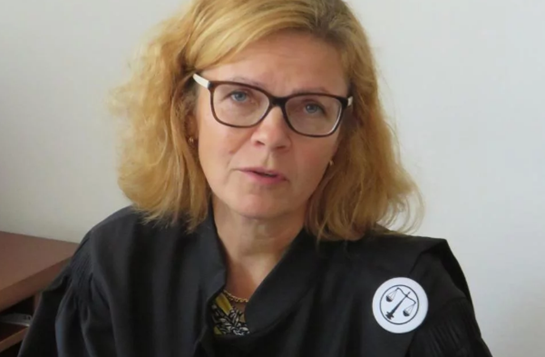The interim President of the Celje Higher Court, Branko Aubreht rejected the request of the lawyer Franci Matoz, who asked for the disqualification of the judge of the Celje District Court, Petra Giacomelli, in the Prostitutes court case against Janša. The interim President also rejected the request to disqualify lay judge Liljana Kač yesterday. The trial against President of the Slovenian Democratic Party and current Prime Minister Janez Janša will therefore continue today.
Last week, at the renewed trial against Janez Janša over allegations of insulting the journalists from the national media outlet, Radio-Television Slovenia, Mojca Pašek Šetinc and Eugenija Carl at the Celje District Court, Janša’s lawyer Franci matzo demanded the exclusion of the President of the Court, Petra Giacomelli, and lay judge Lijana Kač.
Matoz demanded Giacomelli’s disqualification because he doubts her impartiality, as she has so far rejected all of Janša’s defence’s motions, and because an employee of the court has been appointed to the position of lay judge, which also casts doubt on Giacomelli’s impartiality. Matoz also demanded that the lay judge, Lijana Kač, be excluded because she has been employed in the legal aid service at the Celje District Court since 2017. This violates the principle of impartiality and means that the juror cannot objectively decide on the proceedings against Janša, since as an employee, she would probably not act against the will of her employer. The three-member panel that will be deciding on the case consists of two court employees and an external lay judge. So, in the senate, the court, of which the judge has already shown disapproval of Janša’s defence, has a majority.
Apparently, the judiciary is in a great hurry to convict the President of the Slovenian Democratic Party (Slovenska demokratska stranka – SDS) and Prime Minister of the Republic of Slovenia before the elections, as they know that the verdict will later be overturned in higher instances, due to procedural reasons.
Bias is not only a subjective, but also an objective circumstance
Giacomelli, who was deciding on the exclusion of Kač (it is not yet known whether this is the same Kač who last year at the Prebold School Council did not support the request to dismiss Headmaster Peter Žurej), has provided an “interesting” explanation for her decision. You will not believe this, but apparently, the judge asked Kač whether she feels like she is biased due to her employment at the court. The latter, of course, replied (as is stated in point 4 of the explanation) that she “saw no reason for her employment to interfere in any way with her impartiality and independence in deciding on the case.” She also said (as written by Giacomelli): “She pointed out that if her employment was incompatible with her status of a juror, she should not and could not have been elected to this position; however, she had already been sworn in in the Higher Court during her employment in court. She added that she will have no problem accepting and respecting any kind of decision.” Great, isn’t it.
According to Giacomelli, the employment of a person is not important for the appointment or the dismissal of a lay judge. Because that is what the law says. And while the latter is true, the doubts about such a person’s impartiality is certainly expressed under point 6 of paragraph 1 of Article 39 of the Criminal Procedure Act, which states that a judge or lay judge may not perform judicial duties if there are circumstances that cast doubt on his impartiality. And her employment in the Celje District Court is certainly doing just that, even though she was confirmed as a lay judge by the Higher Court in Celje. Nonetheless, Giacomelli should know that when it comes to Kač, a direct doubt arises as to whether or not she will really be able to make impartial decisions in the senate if the President of the senate is her superior.
Even the interim President of the Celje Higher Court, Aubreht, who was the first to decide on Matoz’s request (otherwise Giacomelli would not have the option to decide on it), of course asked Giacomelli what she thought of Matoz’s request. She replied that there was no reason to disqualify Kač and that Giacomelli should not exclude her, as this is a matter for the senior judges. In short, the judges are protecting each other, and this is exactly what Matoz already expressed as a concern when it comes to Janša’s trial: that the lay judge, as an employee, will not dare to challenge the decisions of judge Giacomelli, who is her superior. The absurdity of this situation could be illustrated with an example of a commission evaluating a bar of chocolate consisting of two employees of the manufacturer of that same chocolate and one random person – it just does not work.
Janja Strah


